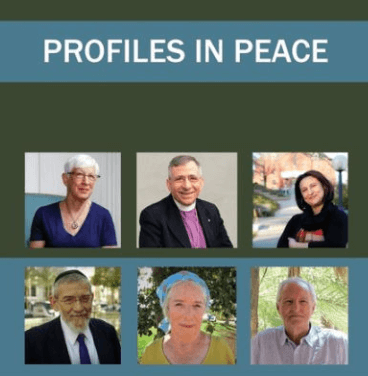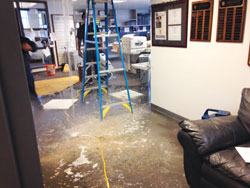Saliba Sarsar, Ph.D., Professor for the Department of Political Science and Sociology, hosted a presentation on the history of the Israeli-Palestinian conflict with guest speaker, Rabbi Ron Kronish, Ed.D., on Tuesday, Nov. 15.
The discussion was held as an online forum and in-person, open for all Monmouth students and faculty members to join. The presentation also discussed Kronish’s latest book, Profiles in Peace: Voices of Peacebuilders in the Midst of the Israeli-Palestinian Conflict.
To kick-off the event, Sarsar introduced the night’s honorary lecturer, “It gives me great honor to present to you Rabbi Dr. Ron Kronish, an authority and an acclaimed interreligious peace builder.”
Kronish is an independent scholar, educator, speaker, and writer. He was also the founding Director of the Interreligious Coordinating Council in Israel (ICCI) from 1992-2016.
“Further, Rabbi Kronish is a prolific writer and editor,” continued Sarsar. Kronish has edited four books of essays and published a book in August 2017, titled, The Other Peace Process: Interreligious Dialogue, A View from Jerusalem.
Kronish discussed the background of his most recent book, Profiles in Peace. “During the last four years, I worked to create a book that tells the stories of six very important people in Israel and Palestine, who have persevered in working for peaceful relations between peoples over many years.”
Per the cover of the book, there are three men and three women represented. According to Kronish, three are Jews and three are Palestinians; of the six, some are secular, cultural, and/or religious. More specifically, these individuals practice three different faiths—Judaism, Islam, and Christianity.
This degree of diversity was intentional on Kronish’s part. He explained, “In this book, I tried to bring in a range of people, all of whom are peace activists at the grass-roots level in Israeli-Palestinian society.”
After his brief introduction, Kronish delved into the intended subject, what he coined, ‘peacemaking’.
“The peacemakers are what I call the politicians; they are the lawyers, diplomats, prime ministers, secretaries of state, etc. They try, every now and then, to negotiate peace between the governments, not the people,” started Kronish.
The trajectory of the lecture aimed to explain peacemaking in greater detail, also commonly referred to as the peace process.
After this point, Kronish and Sarsar welcomed questions from the audience.
One student asked Kronish how the American foreign policy impacted the peace process, and if it has changed throughout the decades.
“The American foreign policy is mostly consistent; most American administrations (since the day of Clinton), both Republican and Democratic, have pushed the peace process and tried to maintain the image of a neutral, honest broker,” answered Kronish.
Kronish expanded, “The current administration is presently trying to restore the classic American position, which is to negotiate for a two-state solution based on the Oslo Accords.”
Sarsar followed up with another question, “In looking at peace-builders, are there any distinguishing characteristics about the Jewish peace-builders and the Palestinian ones in the battle for peace?”
Kronish responded, drawing inspiration from his book. “When looking at these six, I think they share an awful lot of common characteristics. Four out of the six are faith-based, and the ones that are not faith-based are secular faith-based. So, they are all believers, persistent, and unwilling to give up decade after decade.”
“Most of them, if not all of them, are supporters of non-violent protests,” Kronish said, meaning they are in favor of non-aggressive means to combat the occupation and bring peace to both peoples.
Upon analyzing the evolution of the Israeli-Palestinian conflict and engaging with the audience, Kronish summarized, “Miracles can happen and have happened, whether they are divine, human, or combined; therefore, I conclude, we need some more miracles— to expect things that are not in the cards in order for peace to happen.”




